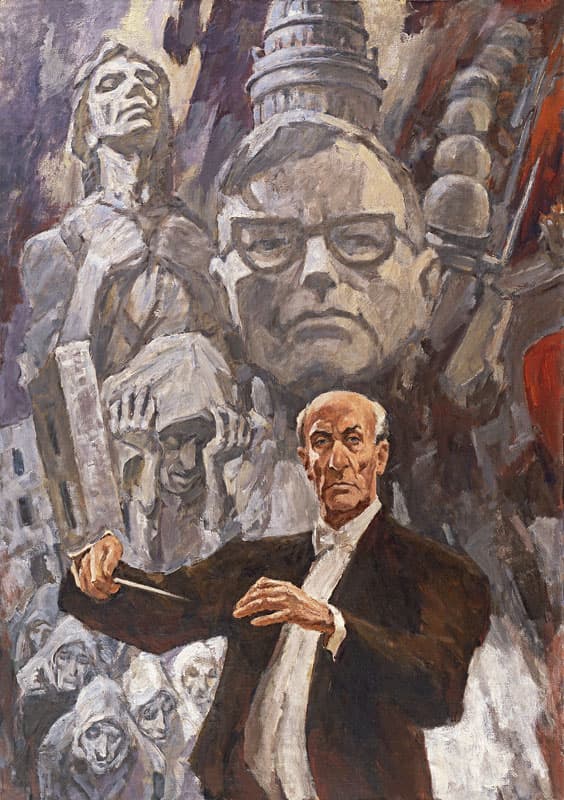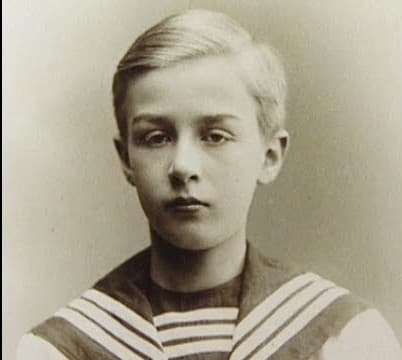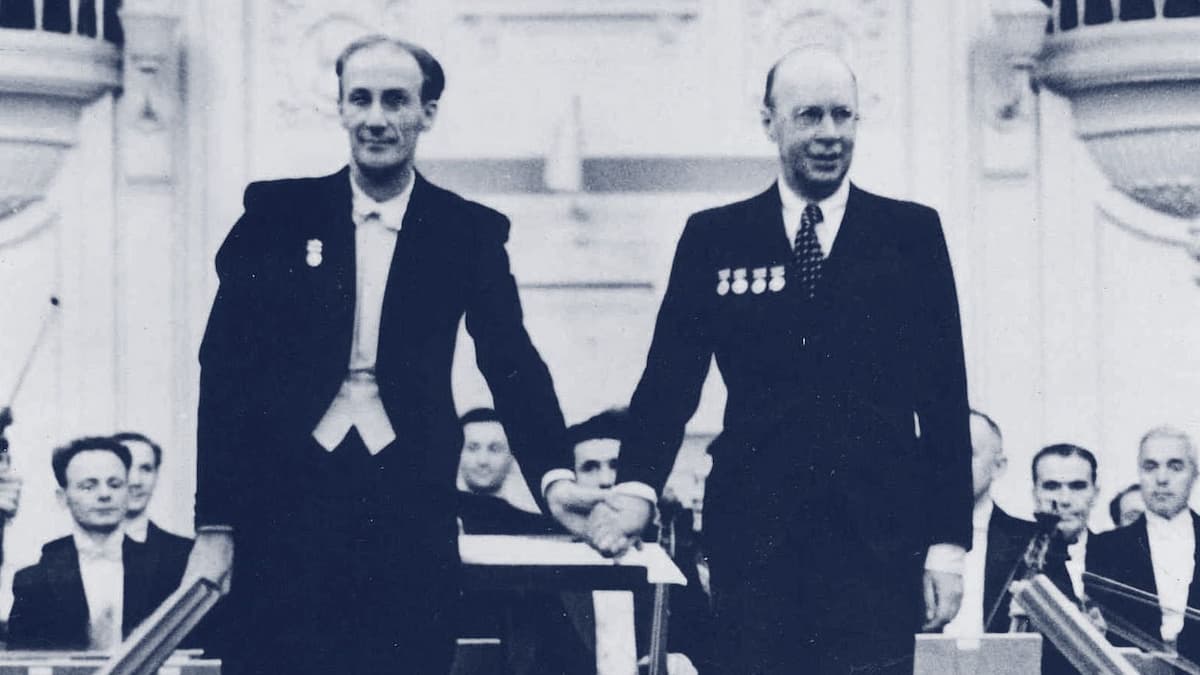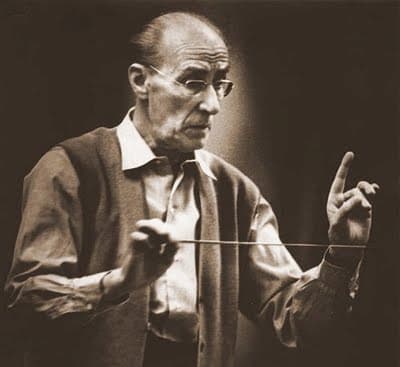The city of St. Petersburg was founded in 1703, and it quickly developed into “the most opulent, precocious, and enlightened metropolis in the Russian empire.” The Academy of Sciences was founded in 1717, and Mikhail Glinka produced the first nationalist operas for the Imperial Theatre. Anton Rubinstein founded the first music conservatoire, and Tchaikovsky was among its first students with the “mighty handful” preparing new musical and cultural paths.

Lev A. Russov’s The Leningrad Symphony Conducted by Yevgeny Mravinsky
The city was home to a flourishing aristocracy, among them the Mravinsky, originally spelled Mrovinsky, family. The family was highly active on the military and political front, with Alexandra Kollontai becoming the first woman to act as a fully-fledged Russian ambassador. However, the family also harbored great musical talents. Evgeniya Mravina made her professional debut in the part of “Gilda” in Rigoletto at Teatro Vittoria Veneto on 7 August 1885. Her sister reports, “It seems that she had only to open up and there would flow forth pure, wonderful sounds.” In the event, Evengiya subsequently featured prominently at the Mariinsky Theatre, and she was much admired by Tchaikovsky for her role in his opera Eugene Onegin. In fact, Tchaikovsky would subsequently write the role of “Lisa” in The Queen of Spades for her.
Yevgeny Mravinsky Conducts Tchaikovsky’s Symphony No. 5 in E minor, Op. 64
Yevgeny Mravinsky was born on 4 June 1903 to Alexander Konstantinovich Mravinsky and Yelizaveta Nikolayevna Filkova. His father had forgone a career in the armed forces and opted for a tranquil career in law, serving as a jurist in the General Staff of the emperor. His mother came from a prosperous family of the gentry, and the couple met at a soiree in St Petersburg. As a biographer writes, “despite differing generations and temperaments, the couple shared a belief in knowledge and scholarship in the sciences and fine arts.” Yelizaveta had yearned for a girl, who “would become a pianist or painter,” but their first and only child turned out to be the boy Yevgeny. Alexander was a strict disciplinarian, and Yelizaveta’s love for music and poetry would deeply influence her son.

Yevgeny Mravinsky as a boy
Yevgeny started piano lessons at the age of six with Valentina Strem, and around that time he was also taken to the Mariinsky Theatre to see Tchaikovsky’s ballet The Sleeping Beauty. The experience was electrifying, as “he beheld a vision of paradise, the colors, lights, the huge crystal chandelier in the cupola.”
Sergei Prokofiev: Symphony No. 6 in E-flat Minor, Op. 111 – I. Allegro moderato (Leningrad Philharmonic Orchestra; Yevgeny Mravinsky, cond.)
At the age of 10, young Yevgeny received a season ticket for the theater from his mother. As he later recalled, “I managed to catch Siegfried… Returning home devastated, I searched for the piano and tried, as best I could, to recollect the notes. A cold chill trickled up my spine. Stirred by a new, enigmatic sensation, the composer appeared equally as a magician and sorcerer capable of some mysterious force. It was impossible to perceive him as a real person, only as a genius.” However, music was not his exclusive passion as “Zhenya,” as he was nicknamed by his parents, also developed a strong interest in zoology and botany. He was clearly drawn to the natural sciences, yet had a strong passion for poetry as well. As Mravinsky started to prepare himself for entry into the Conservatory of Music, the Bolshevik Revolution broke out in 1917.
Dmitry Shostakovich: Symphony No. 5 in D Minor, Op. 47 – I. Moderato (Leningrad Philharmonic Orchestra; Yevgeny Mravinsky, cond.)

Yevgeny Mravinsky and Sergei Prokofiev
The Revolution of 1917 had a devastating effect on the Mravinsky family. It indirectly caused the death of his father from tuberculosis, and their apartment was confiscated and transformed into a communal flat. A biographer writes, “the cart bearing the remaining belongings of the family, evicted from their home, rumbled slowly over the cobblestones, accompanied by urchins shouting abuse, throwing stones, and stealing their bread rations.” Mravinsky began to work backstage at the Mariinsky Theatre, serving as a ballet répétiteur from 1923 to 1931, and he decided that music was to be his future. He attempted to enroll in the Conservatoire in 1923, but was not accepted as restrictions had been placed on former members of the aristocracy.

Yevgeny Mravinsky
As a result, his aunt Alexandra wrote directly to the rector of the Conservatoire, Alexander Glazunov. Her letter, emphasizing the distress of the family circumstances, and that “Mravinsky had a prodigious musical mind that merited assistance,” was sufficient to allow his entry into the composition class as a non-fee paying student in September 1924. He took music theory with Mikhail Chernov, and his compositions won recognition at the Conservatoire. However, as he “felt drawn to the great and mysterious challenge of recreating someone else’s compositions,” Mravinsky began to explore the possibilities of conducting. And the rest, as they say, is history.
For more of the best in classical music, sign up to our E-Newsletter
